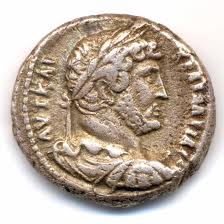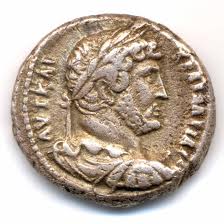Render to Caesar
 A sermon preached at St. Paul’s Church, Bantam, Connecticut on October 16, 2011, by the Christopher L. Webber
A sermon preached at St. Paul’s Church, Bantam, Connecticut on October 16, 2011, by the Christopher L. Webber
Text: St. Matthew 22:15-22 (provided at the end)
So they asked Jesus about the separation of church and state and he asked for a coin and ever since then people have been asking what he meant by what he said. “Render to Caesar the things that are Caesar’s and to God the things that are God’s.” But that was the question to begin with. What does belong to Caesar and what does belong to God? And that argument continues today, and nowhere is the argument more fierce than in the United States.
If you look at other countries around the world you see Islamic countries where the idea of separating religion and government is brand new and there usually is no division or separation and you see European countries that think of themselves as secular and in which the churches have almost no influence. But here the churches have always played a powerful role in shaping society and the exact relationship that ought to exist between church and state has always been a battleground.
But let me review some history because I think we forget how churches and faith-based movements have shaped this country, have constantly worked for change and created change. Think of the abolition movement that dominated the nineteenth century, led for the most part by Christians, culminating in the Civil War and bringing an end to slavery. Think of the women’s suffrage movement beginning a little later in the nineteenth century, led again largely by Christians and churches, and culminating in the Women’s Suffrage amendment in 1921. Or think of the Civil Rights revolution of the 1960s, again led largely by Christians and churches and bringing an end to segregation and second class citizenship for African Americans.
In all of these, Christians set out to change society by ending restrictions on some groups of people. And in these movements there was anger and violence on both sides– think of Bloody Kansas and John Brown and of women chaining themselves to the White House fence and think of Selma, Alabama, and police dogs and clubs – but in the end society was changed, laws were changed, and eventually the changes were accepted by almost all.
On the other hand, think of the Prohibition movement. Here again, you can trace a long and growing effort by churches and Christian people to change society that finally succeeded. Good Christian people were concerned by the impact of alcoholism on children and families and finally succeeded in having it outlawed. Alcoholic beverages were prohibited. But it didn’t work and it didn’t last. The Constitution was amended but then amended again. But Prohibition was different from the other moral crusades because it was not an enhancement of freedom but a restriction of freedom and however well intended it just didn’t work. This time the violence and lawlessness came after the change. People, it turned out, would rather break the law than have their freedom restricted. And Prohibition produced one of the most lawless eras in our history.
I see our present differences in the light of all this history. It seems to me – and I’m speaking very personally because Christians differ radically on these issues and you have a perfect right to disagree with me – it seems to me that the effort to restrict abortion and to maintain restriction of homosexuals is more like the Prohibition campaign than the Civil Rights campaign, that it aims to restrict freedom, not enhance it.
Now, I think there’s altogether too much abortion but I don’t think the answer is laws. I think the answer is in learning to use our freedom. Freedom involves risks and danger but the whole course of human history, it seems to me, has been in the direction of greater freedom and learning to use that freedom.
Jesus said, “Render to Caesar the things that are Caesar’s and to God the things that are God’s” and that sounds like a neat division between two realms. But if you look at it twice, you have to realize that it isn’t that at all. If you try to divide the world between what belongs to Caesar and what belongs to God, what would you put on Caesar’s side? What is there in the world God made that doesn’t belong to God? Think of that, by the way, when you make your pledge for next year. The question is not, How much should I give?, but how much should I keep? What is there that doesn’t come from God and belong to God?
And besides that, we have a Biblical vision beginning with the prophets and continued in Jesus and culminating in the Book of Revelation of a world remade, transformed. There’s that great proclamation at the end of Revelation, “The kingdoms of the world have become the kingdom of our God and of his Christ, and he shall reign for ever and ever.” So that’s the vision Christians have had in mind in working for abolition and prohibition and women’s suffrage and civil rights: a world, a society, that truly belongs to God and in which all have equal opportunity to serve God and offer God their gifts.
But here’s another aspect of our history: Christians in this country come from two very different places in their understanding of government and its role in our lives and when we set out to reshape society I think we have two very different visions and the visions clash. There are Christian churches, on the one hand, that come from a long tradition of establishment, of working with government for the interests of the whole society. The Episcopal Church with its background in the established Church of England has a very strong tradition of establishment but so do Lutherans and Presbyterians who were part of the establishment in Scotland and Switzerland and Scandinavia and much of Germany. Even the Congregationalists who came here as dissenters became the establishment in New England. So there are those churches on the one hand.
But on the other hand there were the Baptists and Evangelicals who were never the establishment in Europe or America, never had responsibility to shape a society but existed almost always as a persecuted minority. Their focus was not on changing society – they couldn’t – but on the hereafter, the end times, when Christ would return and establish his kingdom and set things right for them. Meanwhile what mattered to them was individual salvation and individual morality. Evangelicals remember when they were converted; Episcopalians remember – or not remember – when they were baptized into the church. The evangelical tradition has been to oppose Caesar and not to imagine that any good could come from government. Their vision has been of churches working on individual morality, not social issues. They could get enthusiastic about Prohibition but not Civil Rights. And today their focus is again on individual morality: abortion and homosexuality rather than unemployment and health care and the larger social issues. Even now, with the evangelical churches playing a major role in our society and electing government leaders it’s individual morality that gets their concern. And with a focus on the coming end of the world it’s hard to get excited about the environment and climate change. Why think about the long term when there may not be a long term?
The evangelical churches have tended to understand Jesus’ words to mean, “Let government do its thing and let Christians do their thing and keep government out of our lives.” Even in the recent elections, when more evangelicals have voted than ever before, the percentage of participation is still below the national average. There’s a long tradition of distrust of government. I think that’s partly why the government was so ineffective in responding to Hurricane Katrina. We had a government that didn’t believe in government. It’s not that evangelicals are indifferent to human need; they will give as generously as anyone and maybe more generously than those of us who think government ought to act; it’s just that they don’t trust government to do the job.
And the tragedy is that these two great Christian traditions have a lot in common and a lot to learn from each other. Just speaking personally I maybe trust government or rely on government too much. Sometimes more government isn’t the answer. Sometimes it’s up to us as individuals to act. And sometimes it isn’t enough to go to church and say the Creed. Sometimes we Episcopalians don’t spend nearly enough time reading the Bible and saying our prayers and concerning ourselves with our own sinfulness and need for conversion. And sometimes we don’t worry enough about the end of the world and the coming judgment. But here we are in a country with more practicing Christians than any other and a chance to make a real difference in our own society and the world but instead of working together we find ourselves at each other’s throats. Christians are and ought to be concerned about human need; they are, and they ought to be, concerned about government control over our lives; they are, and they ought to be, concerned about building a personal relationship with the God revealed to us in Jesus Christ. One tradition has trusted government too much; the other tradition has trusted government too little. We need to reach out to each other and learn from each other and try together to give God the honor and thankfulness that belong to God.
“Render to Caesar the things that are Caesar’s and to God the things that are God’s.” All things belong to God; Caesar is here only to serve God. And part of our task is understanding what Caesar’s role is: is it to enforce God’s laws or to enhance human freedom? Both are good, but how do you balance those goals? Now, these are not easy questions but Christians ought to be able to discuss them without anger, trying to learn from each other, and bearing in mind the prayer that Jesus taught his disciples: “your kingdom come, your will be done on earth.” That’s the goal. That what we need to work for and pray for.
++++++++++++
St. Matthew 22:15-22
Then the Pharisees went and plotted to entrap him in what he said. So they sent their disciples to him, along with the Herodians, saying, “Teacher, we know that you are sincere, and teach the way of God in accordance with truth, and show deference to no one; for you do not regard people with partiality. Tell us, then, what you think. Is it lawful to pay taxes to the emperor, or not?” But Jesus, aware of their malice, said, “Why are you putting me to the test, you hypocrites? Show me the coin used for the tax.” And they brought him a denarius. Then he said to them, “Whose head is this, and whose title?” They answered, “The emperor’s.” Then he said to them, “Give therefore to the emperor the things that are the emperor’s, and to God the things that are God’s.” When they heard this, they were amazed; and they left him and went away.
 Christopher L. Webber
Christopher L. Webber